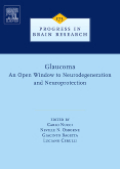
Glaucoma: an open-window to neurodegeneration and neuroprotection
Nucci, Carlo
Cerulli, Luciano
Osborne, Neville N.
Bagetta, Giacinto
Glaucoma is one of the main causes of blindness throughout the world. It is characterized by death of the retinal ganglion cells, which is associated with loss of the axons making up the optic nerve. Recent studies have demonstrated support for the classification of glaucoma as a degenerative disease of the central nervous system (CNS). The search for treatment modalities that are effective for all patients with glaucoma has resulted in numerous studies aimed at identifying neuroprotection strategies for the treatment of this disease, likethose used for other degenerative diseases of the CNS. The present book will provide an in-depth examination of the most recent findings regarding glaucoma, including risk factors, diagnosis, clinical monitoring, treatment, and aboveall, the need for treatment based on the concept of neuroprotection. A large part of the book is devoted to research related to this new approach to the treatment of glaucoma. Aspects that will be analyzed include experimental modelsof glaucoma, clinical protocols for the study of neuroprotective therapies, mechanisms underlying glaucomatous damage to neurons of the retina and other stations in the visual pathways of the CNS, and finally proposals for new strategies for preventing neuronal injury in glaucoma patients.* Describes the most recent developments on neuroprotection of the optic nerve, including experimental models now used and clinical protocols* Discusses new strategies for the prevention of neuronal injury in glaucoma patients* Focuses on evidence-based risk factors, innovative diagnostic aspects and advanced medical/surgical treatment of glaucoma
- ISBN: 978-0-444-53256-5
- Editorial: Elsevier Science
- Encuadernacion: Cartoné
- Páginas: 616
- Fecha Publicación: 10/11/2008
- Nº Volúmenes: 1
- Idioma: Inglés
